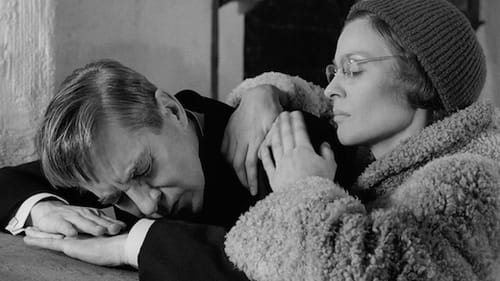Stay in the Loop
BSR publishes on a weekly schedule, with an email newsletter every Wednesday and Thursday morning. There’s no paywall, and subscribing is always free.
A Bergman bonanza
Lightbox Film Center's Autumn Sonata: An Ingmar Bergman Centennial Retrospective

The year 2018 marks the centennial of Ingmar Bergman, Sweden’s most important cultural figure since Strindberg and arguably the one who raised film to the level of the greatest art forms. Festivals in his honor are happening around the world, including one with relatively little fanfare at the Lightbox Film Center, where 10 of his films, from The Seventh Seal to Autumn Sonata, will be screened through September 21.
Face first
Film became the 20th century’s defining art form and has not yet relinquished its position. Yet there is a sense now that film has seen its best days. Yes, good films are still being made, but great and commanding figures are in short supply. In addition, small screens have all but swallowed the large one.
Bergman’s particular genius was to unfold a singular, uncompromising vision in images of great formal beauty and scenes of harrowing intensity. His work is always focused on the human; viewers must look elsewhere for landscape and vista.
His parallel career as a great theatrical director is evident in his films, but it’s fair to say that what film gave him that the stage did not was the closeup. Frame by frame, a Bergman film offers a succession of stunning visual compositions, but his final subject is what the human face can reveal.
I saw two of the festival’s films: Winter Light and The Silence. Both are from 1963 and are part, with Through a Glass Darkly, of what Bergman once called a trilogy (though he later withdrew this characterization).
Cold as ice
Winter Light, set in the Swedish cold, concerns a pastor’s loss of faith and, by extension, the loss of Christian belief in the modern world.
It begins with a celebration of High Mass in a sparsely attended rural church. The face of Gunnar Björnstrand’s Tomas Ericsson, composed yet deeply troubled, tells us all we need to know about the crisis it depicts.
The scene’s language is formulaic; its shots are few and mostly formal; there is no music — neither in the film nor in Bergman generally. Yet the sense of a world bereft of God is fully conveyed in the very act by which he is invoked and the quiet tension of the scene.
There are two critical moments in the film. In the first, Tomas seeks to counsel a suicidal parishioner, Jonas (Max von Sydow), a fisherman obsessed with reports that the Chinese are about to achieve the atomic bomb. It’s an odd obsession, but he’s infected by the unnerving sense of looming apocalypse. Tomas begins to give him pastoral comfort but abruptly stops, confessing his own loss of faith. Jonas says nothing and leaves to kill himself.
The second moment occurs when Tomas’s sexton, Algot (Allan Edwall), offers a long-pondered observation about his sense of Jesus’s terrible isolation from the disciples who have abandoned him and the God he can no longer find on the cross. Tomas — like Jonas — says nothing. The point is borne home: what, except unspeakable tragedy, are we to make of a Christ who has lost God?

The film’s climax comes when Tomas, turning on his companion Märta (Ingrid Thulin), tells her she is repulsive to him. Stunned, Marta responds that his coldness has also inspired hatred in her, and his lack of feeling is a self-hatred that can only end in death. Struck by this, and impressed by the return of violence for violence, Tomas understands that he and Märta are actually — if unhappily — bound.
Bound by blood
Hatred (and the emotional need it satisfies in the absence of love) is also the theme of The Silence. This film depicts the journey of two sisters, Ester (Thulin again) and Anna (Gunnel Lindblom) through an unnamed, vaguely Central European country whose menace is indicated by a progression of tanks.
Anna, the elder, is an intellectual who is ill, perhaps terminally, of an unspecified lung condition. Ester, accompanied by her young son Johan (Jorgen Lindstrom), is restlessly sensual. Here the atmosphere is not of cold but of unbearable summer heat.
The tension between the sisters is palpable, and it’s unclear why they are traveling together. Like Tomas and Märta, they seem to be tied by the urge to separate. Anna finally explodes, vents her lifelong rage and resentment at Ester and abandons her to what may be her death.
Even in Bergman, this denouement is shocking, but Anna is left only with her own inner emptiness, and the loss — as she does not yet realize — of her child’s love. Love is what everyone in both films seeks, and hatred the consequence of its absence.
That absence is tied in turn to a sense of existential meaninglessness, what Tomas calls “God’s silence.” God isn’t mentioned, if he is indeed conceivable in The Silence, but the title clearly refers to a world without him, and the film depicts it mercilessly. Only Johan seems to offer us a glimmer of hope at the end, with his intuition that something terrible has happened and Ester is not to be forgotten.
Bergman offers a stiff dose. He is also a great artist, and his vision is even more challenging and prophetic than it was 50 years ago. Pick your own film, but don’t miss him as he is meant to be seen: on a real screen.
What, When, Where
Autumn Sonata: An Ingmar Bergman Centennial Retrospective. Through September 21, 2018, at the Lightbox Film Center, 3701 Chestnut Street, Philadelphia. (215) 895-6590 or lightboxfilmcenter.org.
Sign up for our newsletter
All of the week's new articles, all in one place. Sign up for the free weekly BSR newsletters, and don't miss a conversation.

 Robert Zaller
Robert Zaller